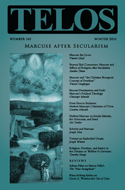Vincent Lloyd’s “Marcuse the Lover” appears in Telos 165 (Winter 2013). Read the full version online at the Telos Online website, or purchase a print copy of the issue in our store.
 Why has Marcuse’s fame faded? I argue that the answer has to do with the way secularism and critical theory do and do not interact in the contemporary academy. We can read Marcuse as a critic of secularism, when secularism is understood as one of the ideas of the ruling class, taking its current form with the rise of identity politics in the 1960s and 70s. Marcuse criticizes the secularizing features of the Protestant Reformation, much like other recent critics of secularism. Further, he seeks to recover a deeper sense of freedom—what might be called a post-secular sense of freedom. In doing so, he appeals to the good, the true, the beautiful, and, in a way, to rightly ordered love. I read Marcuse fundamentally as a critic of idolatry, as a negative political theologian. His work suggests a promising path for conversations about critical theory and secularism to come together.
Why has Marcuse’s fame faded? I argue that the answer has to do with the way secularism and critical theory do and do not interact in the contemporary academy. We can read Marcuse as a critic of secularism, when secularism is understood as one of the ideas of the ruling class, taking its current form with the rise of identity politics in the 1960s and 70s. Marcuse criticizes the secularizing features of the Protestant Reformation, much like other recent critics of secularism. Further, he seeks to recover a deeper sense of freedom—what might be called a post-secular sense of freedom. In doing so, he appeals to the good, the true, the beautiful, and, in a way, to rightly ordered love. I read Marcuse fundamentally as a critic of idolatry, as a negative political theologian. His work suggests a promising path for conversations about critical theory and secularism to come together.



